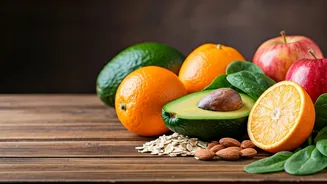Oats: Heart's Best Friend
Oats, a breakfast staple, are packed with soluble fiber, a key ingredient for lowering cholesterol. When you eat oats, the soluble fiber binds with cholesterol in your
digestive system, preventing its absorption into your bloodstream. This process helps reduce levels of low-density lipoprotein (LDL) cholesterol, often referred to as 'bad' cholesterol. Aiming to incorporate oats into your daily meals can contribute significantly to better cholesterol management. Besides their cholesterol-lowering properties, oats also provide a hearty dose of complex carbohydrates, which means they slowly release energy. This prevents sudden spikes in blood sugar levels, helping you feel fuller for longer. A quick and easy way to enjoy oats is to make oatmeal. You can add fruits like berries or bananas to enhance its taste and nutritional value. For a savory twist, try adding vegetables and spices.
Beans: Fiber Powerhouse
Beans, including kidney beans, navy beans, and lentils, are rich in soluble fiber. Like oats, this fiber helps lower cholesterol by binding with it in the digestive tract. Eating beans regularly is a simple way to improve your cholesterol profile and overall heart health. Furthermore, beans are a fantastic source of plant-based protein, making them an excellent alternative to meat. Protein is vital for muscle repair and overall body function. They are also packed with essential nutrients and vitamins. For instance, beans contain folate, which is necessary for cell growth and function, and iron, essential for carrying oxygen throughout the body. There are many ways to include beans in your meals. You can add them to soups, salads, or stews, or use them as a base for vegetarian burgers or dips like hummus. Adding beans to your diet not only lowers cholesterol but also enhances the nutritional value of your meals.
Nuts: Healthy Fats
Nuts, particularly almonds, walnuts, and cashews, are beneficial for lowering cholesterol levels, mainly due to their monounsaturated and polyunsaturated fats. These fats help lower LDL cholesterol while maintaining or improving levels of high-density lipoprotein (HDL) cholesterol, often called 'good' cholesterol. It's important to remember that nuts are calorie-dense, so moderation is key. A small handful daily provides significant health benefits without excessive calorie intake. Nuts also provide protein and fiber, promoting satiety and aiding in weight management. Consider adding a small portion of nuts to your breakfast cereal, salads, or as a snack between meals. Make sure you select unsalted varieties to limit your sodium intake and maximize the health benefits. Whether it's the crunch of almonds or the rich flavor of walnuts, incorporating nuts into your diet is a delicious and heart-healthy decision.
Fatty Fish: Omega-3s
Fatty fish, such as salmon, mackerel, and sardines, is an excellent source of omega-3 fatty acids, which can lower triglycerides and slightly reduce LDL cholesterol. Omega-3s also benefit your heart by reducing inflammation and the risk of heart disease. Aim for at least two servings of fatty fish per week to gain these heart-healthy benefits. Fish is not only beneficial for heart health but also provides high-quality protein and essential nutrients. These nutrients are essential for overall health, and consuming fish regularly can contribute to a balanced diet. Preparing fish can be simple and enjoyable. You can bake, grill, or pan-fry the fish, adding herbs, spices, and lemon to enhance the flavor. Be mindful of how you cook the fish, avoiding excessive oil or frying, and opting for healthier cooking methods to maintain its nutritional value and health benefits.
Fruits and Vegetables
Consuming a variety of fruits and vegetables is crucial for overall health and managing cholesterol levels. Many fruits and vegetables are rich in soluble fiber and plant sterols, which can block the absorption of cholesterol in your body. Focus on eating colorful options like berries, apples, pears, and citrus fruits. Leafy greens, such as spinach and kale, are rich in antioxidants and vitamins. Including these in your diet can benefit your health. It is not just about the fiber; the antioxidants found in fruits and vegetables also help fight inflammation and protect against oxidative stress, reducing your risk of heart disease. Prepare your meals and snacks around fruits and vegetables to make them the core of your diet. Try smoothies with berries and spinach for breakfast. Prepare salads with a variety of colorful vegetables and fruits. As a healthy snack, you can eat a piece of fruit or have some vegetable sticks with hummus.
Avocado: Heart Healthy
Avocado contains monounsaturated fats, which are beneficial for heart health. These fats can lower LDL cholesterol, contributing to healthier cholesterol levels. Additionally, avocados are rich in fiber and plant sterols, both essential for managing cholesterol. Besides their cholesterol-lowering benefits, avocados provide several other health advantages. They are a good source of vitamins, including vitamin K, vitamin C, and B vitamins, along with minerals. They also contain antioxidants, which help protect your cells from damage. Avocados can be easily incorporated into many dishes. You can add slices to salads, sandwiches, or tacos. Use them in smoothies for creaminess. One of the best ways to enjoy avocado is to make guacamole, serving it with whole-grain crackers or vegetable sticks. Consuming avocado as part of your diet provides you with a healthy dose of good fats and helps regulate cholesterol levels.
Dark Chocolate: Antioxidants
Dark chocolate, in moderation, can be a treat that benefits your heart health by containing antioxidants, specifically flavonoids, which may help lower LDL cholesterol and raise HDL cholesterol. Choose dark chocolate that contains at least 70% cocoa for the most benefits. However, keep in mind that chocolate is calorie-dense, so moderation is essential. Eating too much can negate the benefits. Besides heart health benefits, dark chocolate can also boost your mood because it stimulates the release of endorphins. It can also improve blood flow. Enjoy dark chocolate as a small piece after meals or as a treat. Combine it with other healthy foods like nuts or berries to enhance both the flavor and health benefits. Dark chocolate can be a tasty and enjoyable way to improve your heart health, but it is important to include it as a part of a balanced diet.













